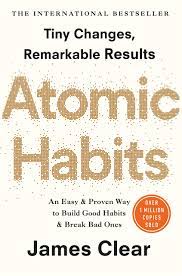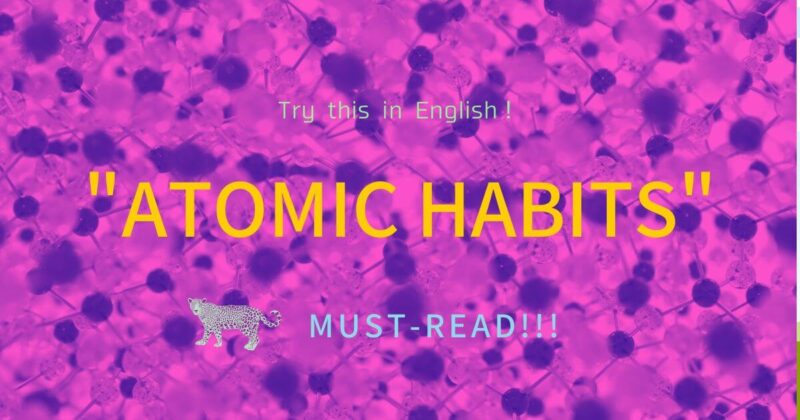Hi there.
I’m konkaz (@konkazuk) and am running a blog called “An Encouragement of Soliloquy in English”.
“Atomic Habits” by James Clear was the first book I selected to listen to when I started using Amazon’s Audible, and this is my fifth time round to listen again.
While I sometimes wish to reread books, I rarely do so with paperbacks because there are always many others I want to read. However, with audiobooks, I can listen during my commute, making it possible to finish a 5-hour-35-minute book in just a week.
So, first of all, I really would like to recommend you to try Amazon’s Audible (audiobook).

Listening to the audiobooks with a small pocket of time such as the time to commute will dramatically increase the number of the books you can read within a year.
I propose trying Amazon’s Audible free trial from the link below so as not to regret like “Why didn’t I start using this long time ago!!?” after finding out that people around you have already been using this for some time, 👇
(If there is no information of free trial appearing on the page, then scroll it down to the bottom and you should spot the word “Audible” with small letters in the footer area in black colour. And when you click the word, it will take you to the page to deal with.)
If you cancel your trial within the campaign period, its monthly charge will not incur, hence you will not lose anything.

Anyway, let’s bring the subject back on the right track.
Regarding the title of the book “Atomic Habits”, as the word “Atomic” suggests, it gives us an idea which is like…
“by habitualising the implementation of small actions as tiny as atoms and keeping it going,”
we can really change our lives.
And also it has got an impact of explosive energy that could be associated with the word “Atomic bomb” although it doesn’t give us a good impression at all, therefore I guess the title of this book is quite striking.
I rarely reread (relisten to) any books I have once read, but I do with this book in order to check if what I am currently doing is really on the right track whenever I start feeling numb as a result of absorbing too much information.
Anyway, this book is packed with full of know-how to habitualise whatever you are aiming to achieve just like a mountain of treasure, but since it’s not possible to go through every single chapter, I have picked 3 topics I was personally impressed.
Ice only begins to melt at the temperature of 32℃

One of the reasons why we often fall by the wayside on the way to achieve our goals is because…
“we cannot see how far we have come closer to our goals while we are making an effort.”
,isn’t it?
We become worried at some point when we are not able to gauge how far the progress has been made, while we have been steadily working on something for some time.
And in this book, the author is featuring a story which is like…
You take an ice cube out and the temperature goes up like…25℃, 28℃, 30℃… but you don’t recognise any changes happening to it at all. You only see it beginning to melt when the temperature finally hits 32℃.
It’s a shame to give up what you have been doing while you have actually reached the point of 30℃ or 31℃, however, it is totally understandable because people must have invested lots of hours and money to get to this stage and yet they cannot see its outcome.
And furthermore, most of the time, when we eyewitness something that has been achieved, what we are seeing is often only the surface of it but no the process of how it has reached there, hence we tend to imagine that things have been achieved within a short period.
For this reason, we expect to see the result of our effort very soon after the onset, and we incline to give up what we have been doing on the way even though the fact that we are steadily moving towards our goals, then we start doing something new again.
In my case, it took a fairly good amount of time before reaching the level that I can speak in English comfortably, to be honest.
There were some periods that I hardly studied as well as some periods that I really tried my best, but what has brought me here, at the end of the day, is the fact that I kept going even if it was on and off.
We often hear the proverb “Persistence pays off”.
I guess it is crucial to have a long-term perspective with what we do so that we will not judge ourselves as incompetent after experiencing only a few failures and do not give up until we get there.
Put yourself in the situation where what you are trying to do is happening just as a normal event.

This is quite important, isn’t it?
The author was saying something like…
“While we are in a group/community, even if we have got a different opinion from others’, we tend to choose to get on with other people rather than winning an argument”
in his book, and I have to admit that I have acted in the same way so many times in this kind of situation. w
To put it the other way round, while you are endeavouring towards your objective, if there are nobody else doing the same thing within the environment, it eventually will become difficult for you to continue. (No matter how much pumped up you were in the beginning…)
Naturally, if you put yourself in a group of like-minded people, things will work out so much easier for you to continue what you are doing.

A good example can be those who are studying English and have created an account on Twitter to post their daily progress or to interact with others.
I am not particularly studying English for the exam of TOEIC, however, I can say that browsing through some comments that are tweeted by those who wake up early in the morning to study English for their exam before going to their work can really whip my lazy arse and urges me to keep learning English.
They call their morning activity “Asa-katsu” and they tweet a list of what they are going to learn on the day in the morning, and they reveal what has been achieved and what has not at the end of the day.
Seeing all these tweets makes me realise that I am a little bit too laid-back and gives me an enough incentive to keep my learning-habit going.
Therefore, I am witnessing firsthand the effect of putting yourself in the an environment where what you are aiming at is happening just as a “normal” event.
Spending time for implementation than planning.

This is a part of what was mentioned in the chapter eleven and if I summarise it, it will be…
Things like gathering information and deepening your knowledge for preparing to attain your goal is important, but don’t you think you are spending too much on doing this and not making real progress?
I presume many of us have got stuck in this situation at some point, haven’t we?
I must confess that I do find myself in this situation from time to time.
Too much of preparations and no moving forward… w
Spending time on acquiring knowledge and other preparations surely makes you feel at ease, so they will give you some sort of satisfaction.
However, the author of the book says that “Spending too much time on planning is the same as procrastinating” and it often turns out to be true, therefore, it indeed is a dangerous habit.
My personal experience was such as spending too much time on arranging the design of blog site and hardly making progress with writing articles, or while studying, I would give too much focus to write down things neatly so that I could revise them easily later on, however, it often turned out that I had actually learnt none of the content while I was copying.
The author is explaining this situation by using a couple of words “motion” and “action” in his article, so if you are interested, please have a look.
It is a simple fact that if you don’t act, you will not make any progress and you can only learn from screwing up things while you are putting whatever into practice, hence spending too much time on preparation so as not to fail or in order to make things look good is just like “procrastinating” as the author says.
Finally…

I have picked 3 topics I was personally impressed with this blog post and as I mentioned in the beginning, these are only the tip of the iceberg and the author is sharing lots more of his striking insights in this book.
In fact, you can find dozens of practical and specific methods to “habitualise your action” in this book in order for you to be able to move yourself forward.
If you are aiming to achieve something in whichever the field you are working on, habitualisation of your daily effort is essential, therefore this book is a truly “must-read” for you.
And furthermore, I have personally found that this book is much more concise and practical than a famous book called “The 7 Habits of Highly Effective People” by Stephen R. Covey.
So anyway, for those who are not used to reading English-written books in paper, it could be daunting to try reading the one that has got a certain thickness, therefore I recommend you to become a member of Amazon’s Audible and “listen” to this instead. 👇
And for those who have no problem reading English-written book in paper and have enough of time to read through, or for those who would like to check what is written in the paperback as well as listening to it with the audiobook, here is the link. 👇
Finally, for those who would like to read in Japanese… 👇
I believe if you are currently working on whatever you are up to to achieve your goal, you will bump into this book at some point in the future, so it’s better to read this sooner.
konkaz
You can read this blog post in Japanese from the link below.
👉 この本に書かれている習慣化するための方法をマスターすれば、道は開ける!【Atomic Habits by James Clear】

